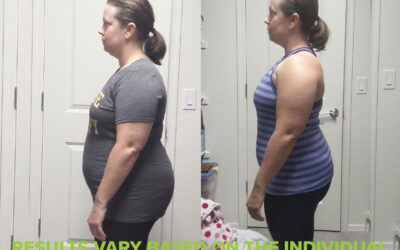Life after menopause brings a new set of changes that go far beyond hot flashes and mood swings. This season can be empowering, but it can also come with challenges that leave you uncertain about how to maintain optimal health. Most people focus on the visible aspects of menopause, such as unwanted weight gain or the dreaded belly fat that seems to appear out of nowhere. Yet true wellness in your post-menopausal years transcends weight control and addresses every dimension of a healthy life: mental clarity, cellular rejuvenation, and sustainable energy. For the past 30 years, I’ve been guiding clients toward better health through Personalized Nutrition Concepts, and I’ve seen firsthand how a comprehensive approach can transform what might feel like a daunting stage into an era of newfound vitality.
Understanding menopause and weight gain is crucial to embracing these life changes. In particular, many women notice a spike in belly fat, often referred to as menopausal belly fat, which can be stubborn and resistant to crash diets or random workouts. This shift in fat distribution isn’t just cosmetic; it can also influence long-term health. Hormonal changes during menopause reduce the production of estrogen, leading the body to store more fat around the midsection. Additionally, muscle mass tends to diminish with age, slowing down the metabolism. The good news is that a truly holistic strategy, including effective weight loss programs without starvation, can help you navigate these shifts gracefully.
For years, we’ve been told to try quick fixes like extreme diets or endless cardio sessions. These approaches might deliver rapid results in the short term, but they often backfire, driving you straight into the endless cycle of yoyo dieting. It’s one of the reasons fad diets fail so consistently—they overlook the underlying factors of hormone balance, nutritional sufficiency, and emotional wellbeing. Sustainable weight loss is about more than dropping a few pounds; it’s about recalibrating your entire system so that your body naturally supports a healthy weight. As someone who has witnessed countless transformations, I assure you that a tailored, multifaceted plan can make the difference between fleeting success and lasting vitality.
Creating a Foundation for Health Improvement
Holistic wellness begins with acknowledging that your body is a complex network of interconnected systems. Nutrition is the cornerstone, but it’s only one of several factors that affect your health post-menopause. Stress levels, quality of sleep, and the right type of physical activity all combine to form your overall wellbeing. When any one of these elements falters, the entire system can be thrown off balance, making it harder to achieve effective weight loss, particularly in the midsection.
A targeted dietary approach recognizes the importance of macronutrients and micronutrients in supporting hormone balance, energy levels, and even mood regulation. This is why so many women find success in tailored nutrition programs rather than generalized meal plans. After all, a post-menopausal woman in Scottsdale might have different needs than someone in Chandler with a higher activity level or different metabolic requirements. Personalization allows your nutrition program to reflect these unique factors, ensuring you get the optimal balance of proteins, healthy fats, and carbohydrates to maintain muscle mass, reduce belly fat, and foster better overall health.
Addressing Menopausal Belly Fat
One of the biggest questions I often get is: Why do menopausal women gain belly fat specifically? Hormonal changes during menopause can skew how your body stores fat, steering more toward the abdomen. This doesn’t mean you’re doomed to accept an ever-expanding waistline. The key lies in balancing hormone levels and focusing on a nutritional approach that manages insulin and cortisol, two hormones that can contribute to belly fat when out of sync.
Adequate protein intake is essential for sustaining lean muscle, which in turn keeps your metabolism efficient. Foods to fight menopausal weight gain often include lean meats, eggs, fish, and plant-based proteins like beans and lentils. Additionally, anti-aging foods for cellular health—think leafy greens, berries, and healthy fats from avocados and nuts—play a critical role in managing inflammation and oxidative stress. When incorporated into a customized diet plan, these foods can aid you in reducing belly fat during menopause without feeling deprived.
If you’re aiming to enhance your routine further, consider exercises to target menopausal belly fat, such as strength training, yoga, or Pilates. Strength training can be particularly helpful for those looking to lose weight after 50 because it combats the natural decline in muscle mass that often accompanies aging. When combined with balanced nutrition and adequate rest, targeted workouts accelerate your progress, helping you achieve a leaner physique and a stronger core.
The Role of Hormonal Changes
Managing hormonal changes and belly fat is about far more than counting calories. Your hormones govern how your body uses and stores energy, how it responds to stress, and even how it regulates mood. Elevated stress, for instance, prompts the release of cortisol, which can encourage the body to store additional fat around the midsection.
To manage these hormonal fluctuations, the best strategies include getting enough rest, practicing mindfulness, and ensuring your diet supplies the nutrients you need for hormone production and metabolism. This holistic perspective is what sets Personalized Nutrition Concepts apart. We don’t just hand you a meal plan; we delve into all of the lifestyle factors—like stress management, sleep hygiene, and appropriate exercise intensity—to ensure you get the most out of your nutrition.
Embracing Anti-Aging and Cellular Rejuvenation
Many women in post-menopause also experience skin changes, thinning hair, and subtle energy dips. If you’re trying to improve your biological age through nutrition, focus on foods that offer antioxidants, vitamins, and minerals. These not only help your body fight off oxidative stress but also support cellular rejuvenation from the inside out. Think of incorporating deeply colored fruits and vegetables, which are often loaded with antioxidants, alongside healthy fats from sources like salmon or flaxseeds for added skin benefits.
Staying active is another powerful tool for longevity. Physical activities such as walking, swimming, or light strength training can bolster bone density, increase muscle tone, and safeguard your cardiovascular health. These exercises also support balanced hormone levels, making it easier to overcome challenges like menopausal weight gain. Even if you live in a place as hot as Phoenix or Gilbert, finding forms of indoor exercise or early-morning routines can keep you motivated year-round.
Customized Weight Loss Programs That Work
The truth is, fast weight loss vs. sustainable health strategies often sets up a false dichotomy—sometimes people think they can’t have both, but that’s not always accurate. When you approach weight loss with a “quick fix” mentality, you set yourself up for short-term gains that rarely stick. However, with a customized and science-backed approach, you can see meaningful results relatively quickly, all while laying a foundation for lasting success.
Developing a personalized plan typically involves an in-depth look at your current eating habits, lifestyle, and hormonal profile. Rather than imposing a strict, one-size-fits-all method, we craft strategies to combat menopausal belly fat and other post-menopausal concerns that align with your unique physiology. It might mean focusing on nutrient-dense whole foods, ensuring you get enough healthy fats for hormone balance, and using simple nutrition hacks for better health, like boosting your fiber intake or adding more protein to each meal. Each part of your plan is designed to work synergistically, lifting you closer to your goal without starvation or exhaustion.
The Emotional Landscape of Post-Menopause
While focusing on nutrition and exercise is vital, it’s equally important to consider emotional wellbeing. During and after menopause, hormonal fluctuations can affect mood and stress resilience, which sometimes leads to emotional eating or other habits that undermine weight loss or health improvement goals. Addressing the emotional aspect of post-menopause may include mindfulness practices like meditation, journaling, or light yoga, each of which can help manage stress and encourage a more positive relationship with food.
Social support also plays a key role in achieving holistic wellness. Whether you enlist a friend for a walking routine in your neighborhood or sign up for a local group fitness class in Chandler, community involvement can make a world of difference. Through shared accountability and support, you’re more likely to stay consistent with your new habits and less likely to fall back on old patterns. This sense of connection can also boost your motivation and keep you focused on the benefits of personalized diet plans.
Extending Beyond Weight Loss
The post-menopausal phase isn’t just about beating menopausal weight gain or looking a certain way. Many women see this stage as a prime opportunity to refine their overall quality of life. Perhaps you’ve always wanted to explore athletic performance enhancements or you’re eager to discover ways to maintain robust brain function. Nutrition coaching can address these broader goals by integrating strategies that support cognitive health, improve cardiovascular function, and elevate daily energy levels. When your approach involves the entire spectrum of wellbeing, weight management becomes one piece of a much larger, more fulfilling puzzle.
In addition, post-menopause is often an ideal time to revisit medical checkups, hormone assessments, and other screenings. By identifying any nutrient deficiencies or other issues early on, you can tailor your plan more effectively. Whether you live in Chandler, Phoenix, Scottsdale, or beyond, making use of local healthcare resources can help you stay informed about your body’s evolving needs. When combined with a personalized approach to nutrition, these proactive steps can be instrumental in supporting long-term health.
A Positive Path Forward
Many women begin this journey feeling overwhelmed by conflicting information about diet, exercise, and supplements. And while the internet offers a wealth of data, it can be challenging to separate evidence-based strategies from mere hype. That’s where expert tips for achieving your dream body and a balanced life can come into play. By seeking guidance from professionals who understand the interplay of nutrition, hormone function, and emotional wellbeing, you can eliminate guesswork and create a roadmap to wellness that truly fits who you are now.
This transition doesn’t have to be filled with confusion and frustration. Instead, think of it as an invitation to finally place your well-being at the forefront. Post-menopausal life can be a time of renewal, where all those years of experience empower you to make well-informed, self-loving decisions. Having worked with countless women over the decades, I’ve witnessed the incredible resilience and potential that unfolds when you adopt a holistic lens. Suddenly, strategies that once felt forced or unnatural start to align seamlessly with your day-to-day reality, and the results speak for themselves.
Your Call to Holistic Wellness
At Personalized Nutrition Concepts, my team and I take pride in guiding women through this transformative period. By addressing every aspect—nutrition, hormone health, stress management, and physical activity—we deliver customized weight loss programs that work well beyond the scale. Whether your goal is to reduce belly fat, improve biological age through nutrition, or simply enhance your overall quality of life, you can achieve it with a tailored plan that respects your individuality.
If you’re prepared to begin your journey toward holistic wellness post-menopause, consider starting with an honest self-assessment. Which areas of your health need the most attention? Where have you been experiencing the greatest challenges? A personalized plan begins by asking questions that cut to the heart of your needs, goals, and lifestyle demands.
Remember, this phase of life is not a limitation, but rather a powerful opening to become the best version of yourself. With the right approach, you can not only manage menopausal changes but thrive in the years beyond. Adopting sustainable health strategies that support hormone balance, cellular rejuvenation, and emotional wellness can give you the freedom to embrace life with vitality, confidence, and optimism. It is absolutely possible to beat menopausal weight gain, maintain balanced hormones, and enjoy a high quality of life. All it takes is the right guidance, a willingness to invest in yourself, and a dedication to holistic principles that appreciate the complexity of who you are—post-menopause and beyond.



0 Comments